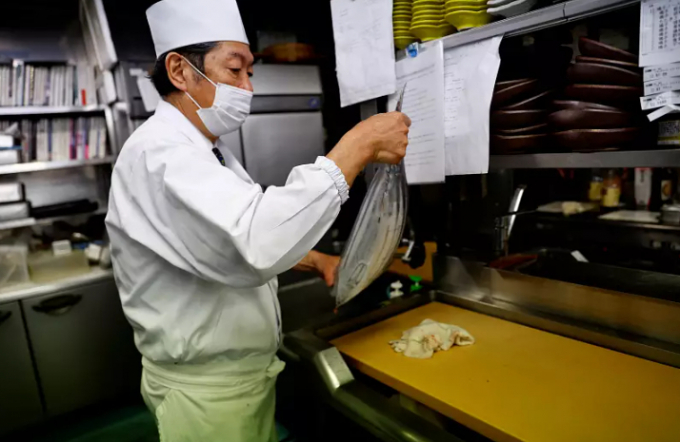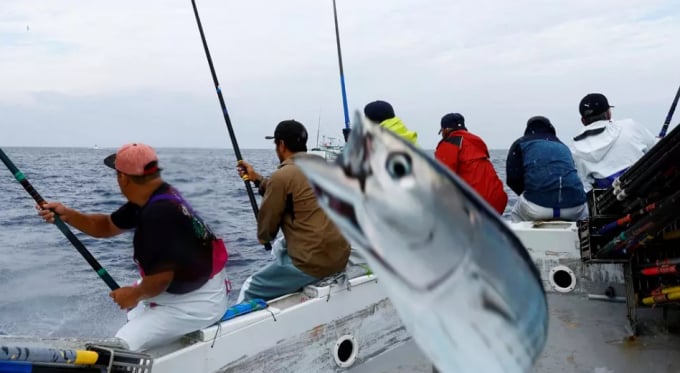May 24, 2025 | 16:22 GMT +7
May 24, 2025 | 16:22 GMT +7
Hotline: 0913.378.918
May 24, 2025 | 16:22 GMT +7
Hotline: 0913.378.918

Head chef Ito says he has "never seen such fatty katsuo during this season of the year.
But he and other fishermen in Kure, in Kochi prefecture in southwest Japan, have seen something worrying in the past two years: an unprecedented number of unusually fatty katsuo.
While heavier katsuo means more money in the short-term, locals and experts say it’s a sign of climate change, and a risk for katsuo numbers already under threat due to growing demand and overfishing.
"The fatty katsuo must have something to do with the water temperature," says the 70-year-old Nakajo. "I have a sense of urgency thinking what if katsuo doesn't come to the bay some day."
Noriaki Ito, the head chef at 106-year-old restaurant Tsukasa in Kochi City, says he too has "never seen such fatty katsuo during this season of the year".
This is worrying as changes in the sea and climate have already wiped out some other fish "including a shellfish called chambara-gai that used to be Kochi's speciality", Ito adds.
Originally from tropical waters, some Pacific katsuo migrate northward on a warm ocean current every spring, making Kochi's arc-shaped bay a fertile fishing ground.
The average surface temperature of the bay in winter has risen by 2C in the four decades to 2015, local fisheries lab data shows, and the fatter katsuo may be due to ample prey in the warmer sea.
But longer term, this warming may prevent mineral-rich water from rising to the surface, resulting in a drop in plankton and smaller fish to feed on. This will lead to fewer katsuo, according to Hiroyuki Ukeda, an agroscientist and vice president of Kochi University.

Locals and experts warn that unusually fatty katsuo is an indicator of climate change.
It comes as Japan's ageing population is threatening the sustainability of local fishing and related businesses such as the production of dried and fermented katsuo, and wasabi horseradish - an eye-watering condiment tucked under fish in a piece of sushi.
In Kure, a district in Nakatosa town, many fishermen have gone out of business in the past three decades, says Takahiro Tanaka, a fourth-generation owner of a fishmonger who calls himself a "katsuo sommelier".
"We can distinguish different tastes of katsuo, just like ordinary French farmers may savour subtleties of wine,” he adds. “This place might be one of Japan's last communities where katsuo is part of the daily culture.
"But without fishers, this won't last," Tanaka warns.
Fisherman Nakajo also rued the ageing community and fewer successors. "I asked my grandson if he would take over, but he's now studying to work at a government office," Nakajo says.
How is climate change threatening sushi more widely?
Overfishing has already hit catch numbers and dealt a blow to the fishermen in Kochi who have stuck to traditional single pole fishing methods versus large-scale seine (net) fishing across the western Pacific.
Government data shows catch numbers in Kochi are only at a quarter of their 1980s peak.
"We have observed a catastrophic decline in landings over the last 10 years or so," says Ukeda.
"A growing number of people fear we may no longer be able to eat katsuo in the near future if things continue like this."
Production of katsuobushi, dried and fermented katsuo, often used as a shaved condiment over traditional Japanese dishes or as a broth base, is already suffering.
The number of katsuobushi manufacturers in Kochi has plunged from dozens some forty years ago to only a few, says Taichi Takeuchi, who runs one in the town of Usa.
"I'm really unsure if we can continue this," he adds.
Wasabi, the tangy horseradish that is an essential for Japanese food, especially sashimi and sushi, is facing similar production challenges.
Typhoons and rising temperatures have hurt production in Okutama, a mountainous area to the west of Tokyo, says Masahiro Hoshina, 72, head of the local wasabi growers' association.
"I am extremely worried about the future of our farming," Hoshina says.
The number of farmers in the area is down 75 per cent from the 1950s due to depopulation, and unless something changes, some worry sushi itself could be endangered.
"The combination of raw fish and spice, as in katsuo and wasabi, is an art, and we must maintain both," says Ukeda. "I never want to think about a future" without them, he adds.
(ERN)

(VAN) Alt Carbon has raised $12 million in a seed round as it plans to scale its carbon dioxide removal work in the South Asian nation.

(VAN) Attempts to bring down the price of the Japanese staple have had little effect amid a cost-of-living crisis.

(VAN) Fourth most important food crop in peril as Latin America and Caribbean suffer from slow-onset climate disaster.

(VAN) Shifting market dynamics and the noise around new legislation has propelled Trouw Nutrition’s research around early life nutrition in poultry. Today, it continues to be a key area of research.

(VAN) India is concerned about its food security and the livelihoods of its farmers if more US food imports are allowed.

(VAN) FAO's Director-General emphasises the need to work together to transform agrifood systems.

(VAN) Europe is facing its worst outbreak of foot-and-mouth since the start of the century.